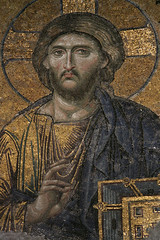Sunday, April 4, 2010
Do we need a Saviour?
As it is Easter, it seems timely to reflect on religion, its role in human society and the near universal need for a savior. In the famous book ‘The Golden Bough’, James Frazer described the transition from magic to myth to religion very persuasively. He examined the origins of European fertility gods and how originally the King was sacrificed at the height of his powers to ensure the return of the sun and the growth of new crops after winter. He was usually re-born again in the spring in a new form. This practice pretty soon gave way to non-human substitutes such as animals and totems. However, it is fascinating to see the survival of such concepts in the continued existence of the Wicker-Man, the phallic may-pole and of course the most famous scapegoat of all, Jesus Christ. However, Frazer’s desire to find a unifying theory of religion caused him to make many dubious assumptions about Non-European indigenous people, their myths and magical ceremonies, leading to much criticism of his work.
It is without question though, that Humans need to belong to a group to survive, and that magic and rituals such as stories, dance or art have always been used to strengthen these bonds, with the unfortunate consequence that outsiders are necessarily excluded. The development of a priestly class, who could intercede on people’s behalf to a God, or Gods, cemented these differences, as their power always depended on the unquestioning acceptance of taboos and on their special knowledge of any rituals or sacred texts. Many modern Christians are scornful about the so called primitive belief in magic yet refuse to recognise that not only does the ceremony of communion when bread and wine are transformed into the body and blood of a sacrificed Christ, but also the concept of resurrection itself, relies on this primitive belief in magic.
Although increased literacy and the translation of sacred texts into common languages have, in most western countries, reduced the power of priests, I believe religion is overall a negative force in society. Many people still believe unquestioningly in texts written in another place and time and continue to uphold taboos relating to food, dress and reproduction which make little sense in the modern world. As we all know, small doctrinal differences can cause violence and all too often, wars. The prevailing view common to nearly all religions is that their particular version of faith is the only and absolute truth and that all other beliefs, however similar, are not only wrong but will lead to eternal damnation. Many are sadly not content to leave this to God but take action in this world to eradicate unbelievers.
Critics of atheism say that secularists too have killed people in the form of Stalinism and other non-religious totalitarian regimes. It is indeed a sad fact that humans tend to want to exterminate others all too freely and that political views as much as religious views have been used to unite people in this way. Also it is true that some Atheists can be as dogmatic and intolerant as anyone else. It is this human desire for certainty and absolutes that leads to trouble in my opinion. However, I can understand why many people want a savior or a hero who will right the wrongs of the world so that we can all live happily ever after but I think we also need to leave room for a little doubt and skepticism, no matter what our world view is. Perhaps we should all celebrate uncertainty as well as fertility at Easter, as that way no one has to die unnecessarily!
Subscribe to:
Post Comments (Atom)



I think that it is just Catholics who say the wine and bread used in communion is really the blood and body of Christ. For most Christians it is just a representation. As for violence and wars, true Christians would not be involved since Jesus Christ preaches peace and love.
ReplyDeleteI admire Jesus Christ greatly and agree with you that he preached peace and love and tolerance. This has not stopped many of his followers who no doubt sincerely thought they were true christians from killing others.
ReplyDeleteWould most Christians believe that he was born of a virgin, walked on water, raised people from the dead and multiplied the loaves and the fishes? I think they would. This seems to indicate a belief in magic to me.